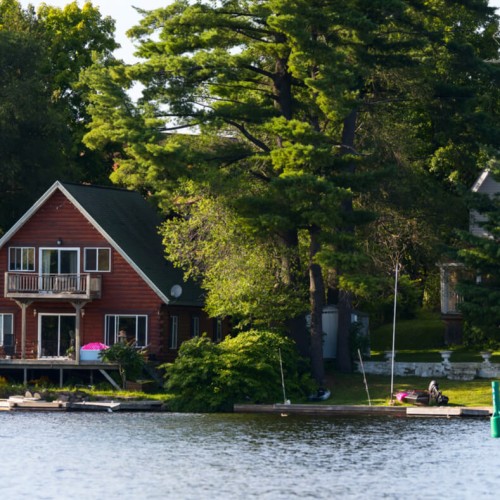The idea of owning a second residence to get away from it all, spend time communing with nature or entertain family and friends, will always be an attractive one. However, aside from the financial aspect, there are many other elements to consider.
Maybe you’re better off renting?
Here’s what you need to think about before buying a cottage.
The fiscal and financial aspects of a cottage
As it is a second residence, financial institutions may require a higher down payment than usual. If they’re asking for more than you’re ready to put down, a mortgage broker will come in handy to help you plead your case.
Also, you might want to check out our article on how to save for a down payment.
Note that when it comes time to sell, the capital gain on the cottage’s value will be taxable. There are ways to lessen the fiscal impact of this transaction, namely through first residence exemption laws, but it would be wise to call upon a financial planner to assist you.
For those who intend to rent out the cottage when it is not in use, that can certainly bring in interesting revenue, especially if the location is popular among the vacation crowd. The constant turnover and the distance can become a bit of an administrative drag, but on the plus side, second residence (or cottage) rentals are not subjected to Régie du logement regulations.
Expenses
Obviously, you’ll need to account for maintenance fees, land taxes and insurance on top of purchase expenses (inspection, appraisal, notary). Nonetheless, it’s also important not to underestimate transportation costs. Even though many providers offer bundles for a second residence, you should still expect to pay a surcharge to get the same telecommunication services at a second address.
You’ll also need to furnish it with everything from furniture to utensils.
Don’t forget to account for condo fees if they apply. Read our article to find out more on what a condo purchase involves.
If you plan on making renovations, check out this article on choosing the right building contractor.
Location, location, location
If you’re buying in the summer, find out what the road conditions and the access possibilities are in winter. Snow removal costs can put a serious dent in your budget.
Examine the certificate of location closely to know the property’s constraints, such as public rights-of-way, in order to avoid any problems after purchase.
A few other things to keep in mind
When it comes to older constructions, don’t ignore the state of the foundations, water supply and septic tank. This is especially true if you’re planning any expansion work. Buying without an inspection can be a recipe for costly, unpleasant surprises.
Wide open spaces and fresh country air hold an undeniable appeal, but watch out for unpleasant odours and contaminated soil.
Find out about existing bylaws, namely restricting certain types of crafts on the lake. You may also be required to ensure a consistent level of upkeep.
Should you rent or buy your cottage ?
It’s recommended to rent before you buy, to see if it’s really worth it and find out which type of cottage is best for you. At the end of the day, owning a second residence is usually much more of a sentimental decision than it is a financial one.
Keys takeaways
- Unlike a first residence, financial institutions often require a down payment equivalent to at least half of the purchase price.
- For those who intend to rent out the cottage when it is not in use, that can certainly bring in interesting revenue, especially if the location is popular among the vacation crowd.
- Don’t underestimate transportation costs.
- When it comes to older constructions, you shouldn’t ignore the state of the foundations, water supply and septic tank. This is especially true if you’re planning any expansion work. Buying without an inspection can be a recipe for costly, unpleasant surprises.

